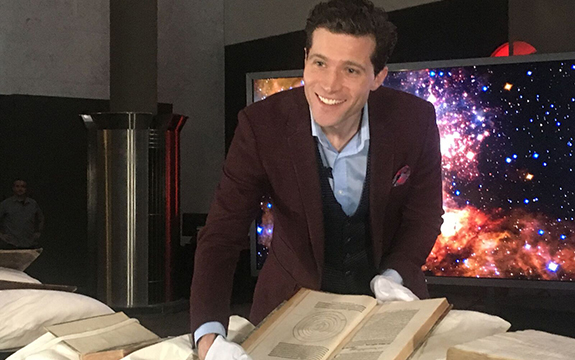Swinburne’s Alan Duffy wins 2017 Tall Poppy Award

In Summary
- Alan Duffy recognised for dark matter research and public engagement
- Young Tall Poppy awards recognise achievements of Australia’s outstanding young scientific researchers and communicators
Swinburne Associate Professor Alan Duffy has been recognised for his contribution to research in dark matter and efforts in public engagement with a Young Tall Poppy Science award.
The awards recognise the achievements of Australia's outstanding young scientific researchers and communicators.
Associate Professor Duffy uses supercomputers as a virtual laboratory, watching as galaxies like our own Milky Way form from basic ingredients like atoms, using simple ‘recipes’ (or laws) like gravity.
To date, he has made more than 100 appearances on popular television shows, explaining everything from gravitational waves and ice ages to the distant Universe. He was recently appointed Lead Scientist at Australia’s Science Channel.
Associate Professor Duffy appears regularly on ABC Breakfast News, and Channel Ten’s The Project and has also hosted premier science shows such as Catalyst.
His radio appearances across the ABC and commercial stations have seen him become a ‘go-to’ whenever there’s a breaking news story involving science or the night sky.
Associate Professor Duffy says he is thrilled with the award and hopes to influence more young people to love and work in science.
“Anyone can understand incredible scientific discoveries; it’s simply a matter of finding the way to bring distant events closer to home,” he says.
As part of the Young Tall Poppy campaign, Associate Professor Duffy will spend a year sharing his knowledge with school students, teachers and the broader community through workshops, seminars and public lectures.
Explaining science
“Australians are naturally curious. I never worry about whether a discovery or event in the night sky will interest them. My efforts are in finding that everyday experience familiar to us all that best encapsulates the science.
“Modern research can sometimes appear incredibly remote from our experiences but it’s often intimately connected with our everyday lives. This is the key for explaining science, finding the way to remind the audience that there’s an incredible world out there and that they are part of this exploration.
“I believe that familiarity with science is critical for our society to respond to the challenges facing it. Often the problems seem insurmountable or too large to deal with and it is only through more science not less that we will overcome them.
“Australia has a bright future ahead if we can encourage the next generation to keep their inherent curiosity, not letting it become dulled trying to fit into prescribed careers but rather going out and inventing their own,” Associate Professor Duffy says.
Young Tall Poppy Science Awards
The Young Tall Poppy Science Awards are run by the Australian Institute of Policy and Science (AIPS) to honour up-and-coming scientists who combine world-class research with a passionate commitment to communicating science. The awards are held on a state by state basis to celebrate researchers across science, engineering and mathematics.
The Victorian awards will be presented today at a cocktail reception at Swinburne’s Hawthorn campus.
“Many Young Tall Poppies go on to become inspiring leaders in their field,” says AIPS General Manager, Ms Camille Thomson. “They also helping to be positive Science ambassadors by working with the education and community sectors to encourage greater engagement in science.”
Young Tall Poppies are nominated by their peers and are early career researchers who have under ten years’ post-doctoral experience. Selection is based on research achievement and leadership potential. More than 600 young scientists have been honoured nationally since the awards were established in 2000.

